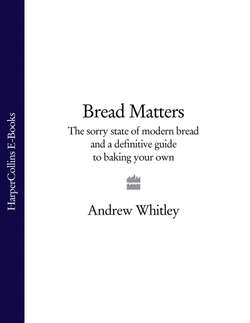Читать книгу Bread Matters: The sorry state of modern bread and a definitive guide to baking your own - Andrew Whitley - Страница 23
Mixed messages
ОглавлениеThe food industry argument goes like this. Thanks to modern agriculture and technology, we all have more than enough to eat these days; everyone can afford a variety of foods from which they derive reasonable nutrition; if this or that food is less than perfect, it doesn’t make any real difference. We should enjoy the unparalleled choices now open to us and stop criticising the food industry.
According to this view, it doesn’t matter if industrial bread is nutritionally depleted because any missing nutrients are available in other foods. The words ‘in the context of a balanced diet…’ are often used to justify questionable products. The large food processing groups and multiple retailers in the UK give public support to healthy eating policies but only in so far as they are not prevented from marketing pretty much any edible substance they choose. Their general strategy is to avoid discussing the particular nutritional profile of any one product. A healthy diet, they insist, results from a combination of food choices, but don’t blame us if legitimate promotion of our brands results in over-consumption of nutritionally depleted products. That’s down to individual choice. The balanced bit of the diet, the message seems to be, can be provided by some other sucker.
Notice how the tune changes, however, when food companies are promoting their special (perhaps a bit more profitable) ranges, all promising ‘wellbeing’ from a ‘lifestyle’ involving ‘healthy eating’. Now the particular, ingredient-specific attributes of this or that product are highlighted: its low-fat, low glycaemic index or high-fibre status, perhaps, or the presence of prebiotics, probiotics or obscure additives that ‘have been linked to heart health’.
Whenever I see an advertisement for a new ‘healthy-eating’ addition to a product range, I itch to ask the obvious question: if all the qualities with which you have so generously endowed this new line are as vital for my health as you imply, why are your ordinary ranges not as good?
So what are they recommending: nutritionally enhanced products or a balanced diet?
The ‘whole diet’ approach to nutrition is useful because it takes account of the variety of foods that people actually consume. It recognises that we do not (and, in my view, should not) see foods solely as bundles of nutrients. After all, food performs many functions additional to mere survival – as a source of comfort, celebration, indulgence and sensual pleasure, for example. But whole diets are composed of individual food types and products and in healthy people the good is balanced with the less good. Limitations of information, money or access mean that some people struggle to achieve this balance. For them, it is crucial that basic foods are as wholesome as possible because they cannot or do not consume the range of foods that contain a satisfactory spectrum of nutrients.
According to the government’s 2002-3 National Food Survey, 99 per cent of UK households eat bread. It forms about 9 per cent (by weight) of the average diet. But low-income families eat more than twice as much white bread and 25 per cent less wholemeal than high-income families. For some people, bread amounts to as much as 20 per cent of their diet. It matters that this bread is good. But the cheapest, most basic British bread, the standard white sliced loaf that accounts for about half of the market, is also the least nutritious. It contains smaller quantities of several important minerals and vitamins than plain wholemeal bread. This leads to another problem. Most people in the UK get enough nutrients, though certain population groups are low in iron and magnesium and almost everyone consumes less fibre than recommended. But the density of everyday foods is important: the fewer nutrients a food has in it, the more portions we have to eat to get what our bodies need. Poor-quality basic foods are programmed for over-consumption. Is it any wonder that obesity is on the rise?
The industrial bakers give out very mixed messages. They promote all bread as being healthy. When challenged to explain how loaves whose nutrient profiles differ considerably can be equally good, they say that the public demands cheap white bread and that it is absolutely fine in the context of a balanced diet. They then promote their speciality breads on the basis that they provide the very things that are glaringly absent in the standard stuff.
By emphasising the low cost, convenience and neutral taste of its primary offering – the white sliced loaf – the bread industry has pandered to a public that knows what it likes and is resistant to change. Why would anyone change, if they were constantly assured that all bread, whatever its type and content, is ‘good’?
